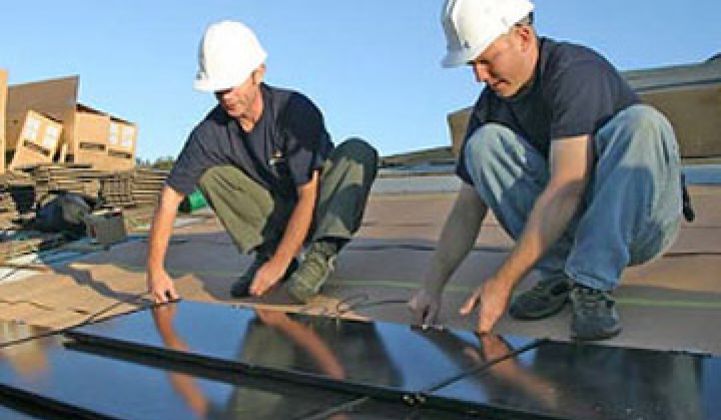What's the best way to establish a nationwide network of solar installers?
SolarCity has taken the tack of hiring and training its own installers.
Sungevity signs contracts directly with customers and oversees its projects, but outsources the actual installation to third-party installers.
Solar Universe, which raised $7 million from Rockport Capital and others in a second round of financing, approaches this process through the franchise model. It seeks out contractors that want to get into solar, trains them, and then provides them with software, branding and sales leads. The customer gets a standardized, arguably more reliable initiation into solar, the electrician enters a new market and Solar Universe gets a portion of the revenue from each job in the form of a royalty payment.
Solar Universe also likes to secure volume discounts on inverters and panels for its franchisees. The company has 21 franchisees, up from zero in early 2008, and hopes to expand to 45 or 46 this year, said CEO and founder Joe Bono. (A former software exec, Bono also owned some Quizno's outlets in the Bay Area in a previous life.)
"Mostly they are electricians, roofers and contractors who are intrigued with solar and have always wanted to get into it," he said.
Installation and paperwork can account for 20 percent or more of a solar project. At Sungevity, 30 percent of the employees spend their days deciphering local building codes and rebate forms. Although solar panels prices have plummeted in the last few years, "soft" and installation costs can be tougher to bring down.
Which approach works best? It's still tough to tell. All will likely coexist for some time. SolarCity captures the maximum revenue from a job, but invariably has the highest capital cost. Sungevity invariably shares its brand. Franchising has a proven track record, but they will compete against local installers who can claim decades of experience.
Leasing, which is driving sales at SolarCity and Sungevity, can arguably also be more challenging with individual franchisees. Larger, centralized organizations can negotiate with big banks directly. Solar Universe leases through a program with Suntech.
Other ideas out there in installation land include modular racks (Zep Solar) modular panels (Armageddon Energy), stick-on solar panels (Lumeta), and plastic instead of aluminum racks. I predicted that installation innovation (call it the plumber's crack conundrum) would become a big trend in the industry in 2009 and someday I will be right.
Like SolarCity, Sungevity and others, Solar Universe tries to squeeze as much cost out of the equation as possible with software. It has devised front office and back office tools, but does not use an online estimation tool. Instead, franchisees physically visit sites and climb on the roof to provide a quote.
Approximately 75 percent of Solar Universe's contracts are residential and 25 percent are commercial. The average residential job comes to around 6 kilowatts. One franchisee accomplished a whopping 25-kilowatt residential installation.
"You'd be surprised. There are a lot of homeowners in California with really high electric bills," he said. (Wonder if these are the same people with the water slide and $6,500 monthly utility bill once mentioned by Recurve's Matt Golden?)
Solar Universe does most of its work in California, but also has franchisees in Nevada, Arizona, New Jersey, Louisiana, and Pennsylvania. It will expand on the Eastern Seaboard next.



